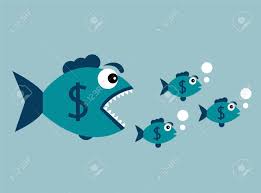Thought Experiment: A New Business Model for the Internet Age
Published on 8 Jan 2020 ⸱ 7 min read ⸱ 44 views

Moats. Moats, as per Warren Buffet, refers to "a business' ability to maintain competitive advantages over its competitors in order to protect its long-term profits and market share from competing firms. Just like a medieval castle, the moat serves to protect those inside the fortress and their riches from outsiders" [0]. Think of moats as defense systems to grow a company while fending off competition, seasonal changes, market forces, regulation and so on. Without Moats, businesses perish in time.
Moats come in different forms - business model, people, technology, network effects, verticalisation and so on. Business of 2010's onward have their own kind of moat in the form of Data. This moat was not available to businesses anytime before in history. Sure, people were collecting stats and data on aspects of their business but no one really thought of Data as a moat. How is Data a moat you ask? It is theorised that the more data you have about a user/consumer the better you can predict what they like and target products, content and services to them based on their needs. Look at Netflix and it's hyper-personalisation of your account and profile. The content you see on your profile is different from another profile within the same account! If you think about it, it does seem like a strong moat to have. Now obviously, I'm not saying that having data is the only moat a business can have but jointly with other moats, a startup can really keep competition at bay.
Startups soon started realising that collecting as much data on consumers and metricising every aspect of consumer interaction can be monetised and be very profitable. Google and Facebook, having the largest user base among tech companies, are notorious for collecting minute user data, more often than not, purchasing data about users from outside their platforms [1]. It's not like Google and Facebook are the only ones guilty of collecting, harvesting and utilising consumer data, every single company in the world with a technology stack is collecting this data. What's worse? they're most likely collecting it illegally, storing it unencrypted and selling the data to third parties. It only gets worse when you realise that not a single country in the world has strong laws to curb this malfeasance. Except GDPR (General Data Protection Rules) in the EU which has it's own set of challenges and comes with no teeth [2].
The largest of tech companies e.g. Google, Facebook, Microsoft, Amazon - you name it, they're all inching towards market capitalisations of USD 1 Trillion each! For perspective, that's larger than entire economies of most countries. For majority of these businesses a large part of their revenue comes from ADVERTISING. For Google and Facebook, because their products and services to end users are free, they earn revenue from advertisers. Makes sense, businesses are not non-profits, they're there to grow in size and revenue. Fair. What's not fair though, in my opinion, is their treatment of consumer data, as mentioned above.
You want to use my data to improve the service/product - fair, use it. You want to use my data to tailor content to my liking - fair, use it. You want to use my data to offer and ad for a product I may like - fair use it. But if you want to sell my data to a third party without my knowledge - not fair, don't use it. You want to collect/purchase data from a third party that I didn't specifically want to share with you - not fair, don't use it. You want to store my data on an unencrypted database for your engineers/hackers to read my content at will and without my consent - not fair, don't use it.
This begs the question - where do we draw the line for these companies? We all want to use their products and services because they genuinely make our lives simpler and better. But businesses cannot run as non-profits. They have to be able to earn revenue and spend that revenue to improve the products and services. At the same time, we, consumers, do not want to pay for many of the products and services we use online. Even for those that we pay e.g. Netflix, News etc. we are flooded with ads.
Moreover in the age of automation, as most of us lose our jobs, how will we, the consumers, earn enough to pay for these products and services in addition to our sustenance? The wealth gap is the widest it's ever been in history [3]. People in the lowest employment brackets will also be the first to lose their jobs to automation. What's the best way to redistribute that wealth as jobs evolve?
I believe an equitable solution, one of many, for this could be to pay users to use the product or service in exchange for using their data.
Think about it for some time - I think it may not be such a bad idea. Technically, businesses still get to collect user data to allow better advertiser targeting. This will ensure advertising revenue for the business. The user gets to choose whether they want to use the product/service in exchange for data capture and analysis by the business. Further, in the age of automation, as mentioned above, where users will not have jobs, this could be the way to "earn a living". There could be tier-based, daily or monthly payments e.g. for interaction data - USD 1, for UGC (User Generated Content) - USD 2, for PII (Personally Identifiable Information) - USD 5 and so on.The dollar values are only for illustrative purposes and not an indication of what I think will be the right value.
One downside of this, that I can think of, could be that startup capital becomes a moat, where the more startup capital you have to pay users, the likelihood of your startup growing rapidly, is higher. This could be difficult for startups that aren't able to raise capital. Furthermore, the larger companies have greater access to capital than a well-funded startup. In someways this is anti-startup I guess. What do you think?

Obviously there will be social and economic consequences of this that I have not thought about. I don't believe that I have put enough thought into the consequences of implementing such a model. But it's a start. I hope to put out a more detailed analysis of the implications of paying users in exchange for their data in subsequent posts. At the same time, I invite you to share your thoughts and analyses on this topic.
Onward.
Update: Andrew Yang, US Presidential candidate 2020, has also called for a similar structure of Tech companies paying users to use their data. His team calls it the Data Dividend Project. The DDP has also gone a step further and formulated an actual Bill to make it a reality.
Extra:
- a16z, a famous Silicon Valley VC fund that I look up to for its deep thought and writing on industries it focuses on, has discussed why they feel Data is not a very strong moat. (Link)
Note: All blogs posts till 2022 were migrated to this platform (react+next+tailwind). While all efforts were made to migrate wihtout any loss, the migration lost some images and broke a bunch of links in old posts. If you spot anything amiss, please notify me?